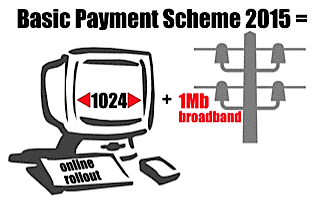
Warning that family farming in the UK is declining, in June the Family Farmers’ Association (FFA) issued a four-point wake-up call to the environment ministry which: “…could help smaller family farms to be prosperous, productive, and valuable to their communities.” [1]
Basic Payments
Top of the list is a GBP 150,000 cap on Basic Payments, as the FFA argues that area-related payments are harming the sector rather than helping farmers.
“Large payments give big farmers the wherewithal to buy more land, thus increasing their payments still further; or to buy bigger machines, thus enabling them to employ fewer people. They are a factor in the excessive price of land, which makes starting a farm almost impossible.”
Describing Basic Payments as an “anomaly” in times of austerity, FFA argues that money saved on a Basic Payments ceiling would be better used to help starters and farmers working difficult land.
Disadvantaged land
Disadvantaged land is the second topic in the action plan, since proper support is crucial to stop moors, mountains or islands being abandoned, with the resulting weakening of the communities concerned, not to mention the rural economy. “There should be higher area payments for all difficult terrain, but coupled with ceilings and the obligation to produce food or other useful things such as tourist facilities.”
The FFA contends that the case for subsidies on good land is a weak one, while public funds: “…are essential on poor land where it is difficult to make a living.”
Tax
The association also argues that the UK tax system needs a thorough review to meet specific aspects of family farming. As well as being able to pass a working farm from one generation to the next, the Family Farmers Association wants to see fair ways of making farms available for: “…keen young people anxious to be farmers.”
These three broad topics lead to the fourth and final argument that the environment ministry DEFRA should be better organised to reflect the importance of food and farming. For this reason, DEFRA “…needs strengthening and bringing up to date.”
Simple dialogue would be a good place to start, the FFA suggests, being careful to stress that dialogue is a two-way process. “At present it [DEFRA] has little actual contact with farmers and therefore has a serious lack of expertise about farming. A proper two-way communication is essential so that farmers can contact DEFRA for advice and information.”
Armed with a better understanding of what family farming needs, DEFRA would be better-placed to appreciate some of the qualitative benefits to the national economy that sustainable farming brings.
“We believe that the success of farming is vitally important to the nation. That success should be judged by the quality and quantity of produce and also by the overall quality of rural Britain, of which it is the backbone.”
The importance of agriculture has been consistently underestimated by DEFRA ministers, FFA argues.
ARC2020 contacted FFA chair Pippa Woods two weeks after the document went to the ministry, to ask if there had been any response or acknowledgement from DEFRA. There was a small eruption at the other end of the line: “Of course they didn’t. What did you expect?”
More
A Further £83 million in cuts for DEFRA






2 Trackbacks / Pingbacks
Comments are closed.